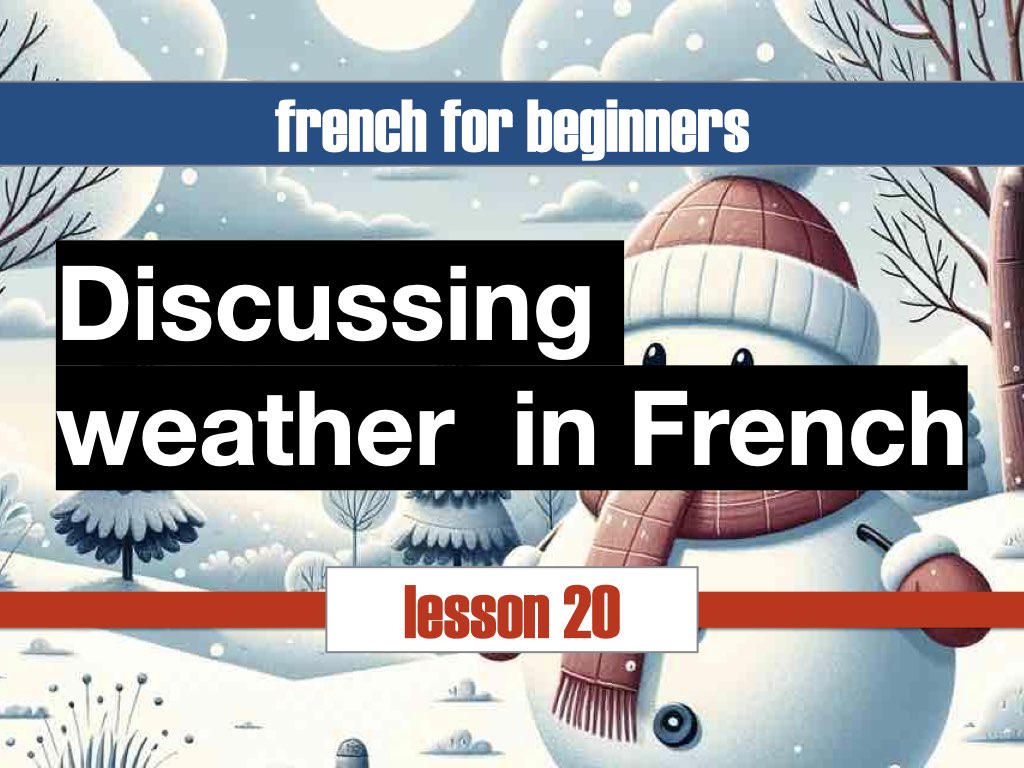Discussing the Weather in French
Here’s how to answer the question ‘What’s the weather like today?
Il fait quel temps aujourd’hui ? What’s the weather like today?
1.1 Using “Il fait” for General Conditions
📌 Grammatical note: “il fait” is generally followed by an adjective to express weather.
- Il fait beau / chaud / froid / frais / mauvais / humide / lourd
Examples :
- Il fait beau. — The weather is nice.
- Il fait chaud. — It’s hot.
- Il fait froid. — It’s cold.
- Il fait frais. — It’s cool.
- Il fait mauvais. — The weather is bad.
- Il fait humide. — It’s humid.
- Il fait lourd. — It’s muggy. / It’s oppressive.
⚠️ To qualify, use the negative form or add the adverbs très (very), vraiment (really).
Examples :
- Il fait très beau. — The weather is very nice.
- Il ne fait pas chaud. — It’s not hot.
- Il fait vraiment froid. — It’s really cold.
- Il fait très mauvais. — The weather is very bad.
- Il fait vraiment humide. — It’s really humid.
Other ways to say “il fait beau” (the weather is nice)
➜ Il fait un temps + adjectif — The weather is + adjective.
- Il fait un temps superbe. — The weather is superb.
- Il fait un temps magnifique. — The weather is magnificent.
- Il fait un temps de rêve. — The weather is dreamy. / The weather is perfect.
1.2 Using “Il y a” for Specific Phenomena
- Il y a du soleil. There is sunshine.
- Il y a du vent. It’s windy.
- Il y a de l’orage. There’s a storm.
- Il y a des éclairs. There are lightnings.
Examples of use:
- Il y a du soleil aujourd’hui, met une casquette. It’s sunny today, put on a cap.
- Attention, il y aura beaucoup de vent cet après-midi. Be careful, it will be very windy this afternoon.
- Il y a de l’orage. Rentrons à la maison. There’s a storm. Let’s go home.
1.3 Using “Il + Verb” for Weather Actions
The verbs “to snow, to rain, to hail” are only conjugated with the impersonal subject pronoun “he”.
Exemples
| present | futur simple | imparfait |
| il neige | il neigera | il neigeait |
| il pleut | il pleuvra | il pleuvait |
| il grêle | il grêlera | il grêlait |

- Il pleut aujourd’hui. It’s raining today.
- Il va pleuvoir. Prends ton parapluie. It’s going to rain, take your umbrella.
- Regarde ! Il neige. Look at ! It’s snowing.
- Il y a un typhon, les cours sont annulés. There is a typhoon. Classes are canceled.
- Il fait très beau aujourd’hui ! The weather is very nice today!
- Qu’est-ce qu’il fait froid ! How cold it is!
- Il fait chaud et humide en été à Tokyo. It’s hot and humid in summer in Tokyo.
Key Vocabulary
| French Phrase | Pronunciation (API) | English Translation |
| Il fait chaud. | [ il fɛ ʃo ] | It’s hot. |
| Il fait froid. | [ il fɛ fʁwa ] | It’s cold. |
| Il fait beau. | [ il fɛ bo ] | The weather is nice. |
| Il fait mauvais. | [ il fɛ mɔvɛ ] | The weather is bad. |
| Il fait lourd. | [ il fɛ luʁ ] | It’s muggy/humid. |
| Il fait humide. | [ il fɛ ymid ] | It’s humid. |
| Il y a + noun | [ il j‿a ] | |
| Il y a du brouillard. | [ il j‿a dy bʁujaʁ ] | There is fog. |
| Il y a du vent. | [ il j‿a dy vɑ̃ ] | It’s windy. |
| Il y a du soleil. | [ il j‿a dy sɔlɛj ] | It’s sunny. |
| Il y a de l’orage. | [ il j‿a də lɔraʒ ] | There is a storm. |
| Il y a des éclairs. | [ il j‿a dez eklɛʁ ] | There are lightning flashes. |
| Le ciel est couvert. | [ lə sjɛl ɛ kuvɛʁ ] | The sky is overcast. |
| Il pleut. | [ il plø ] | It’s raining. |
| Il pleut des cordes. | [ il plø de kɔʁd ] | It’s pouring rain. |
| Il neige. | [ il nɛʒ ] | It’s snowing. |
| Il tonne. | [ il tɔn ] | It’s thundering. |
| Il gèle. | [ il ʒɛl ] | It’s freezing. |


